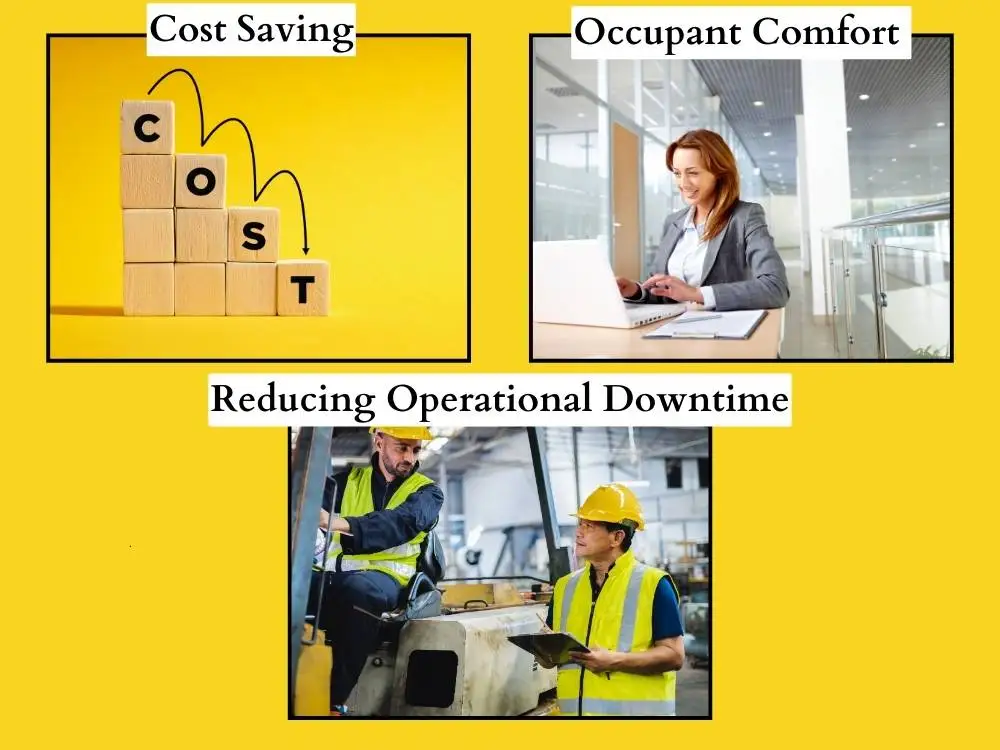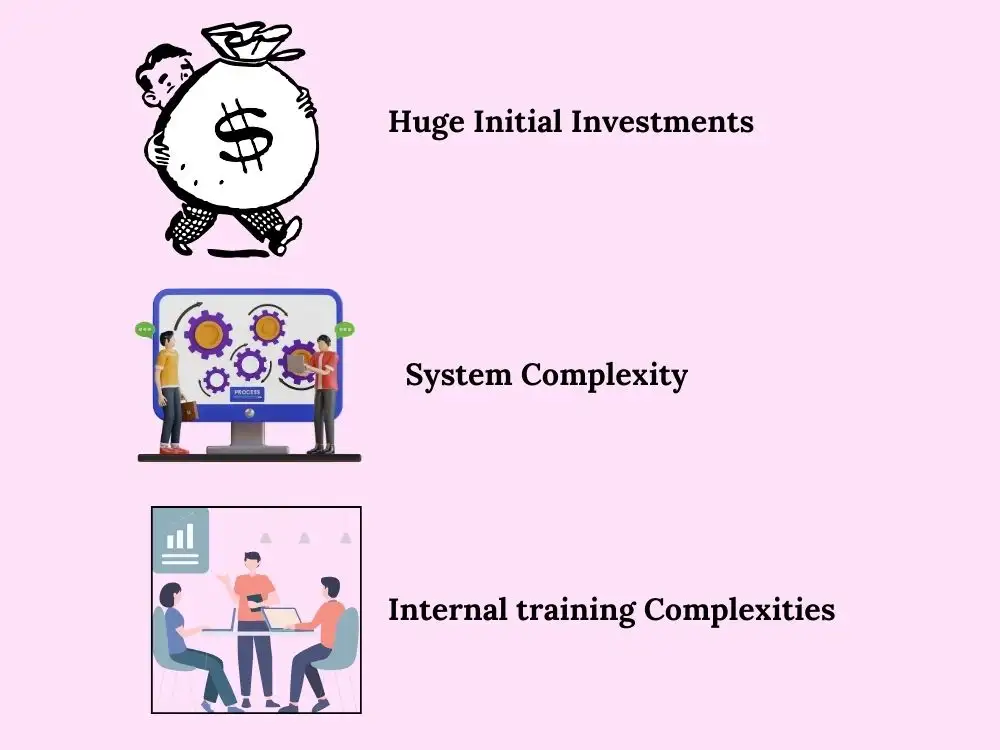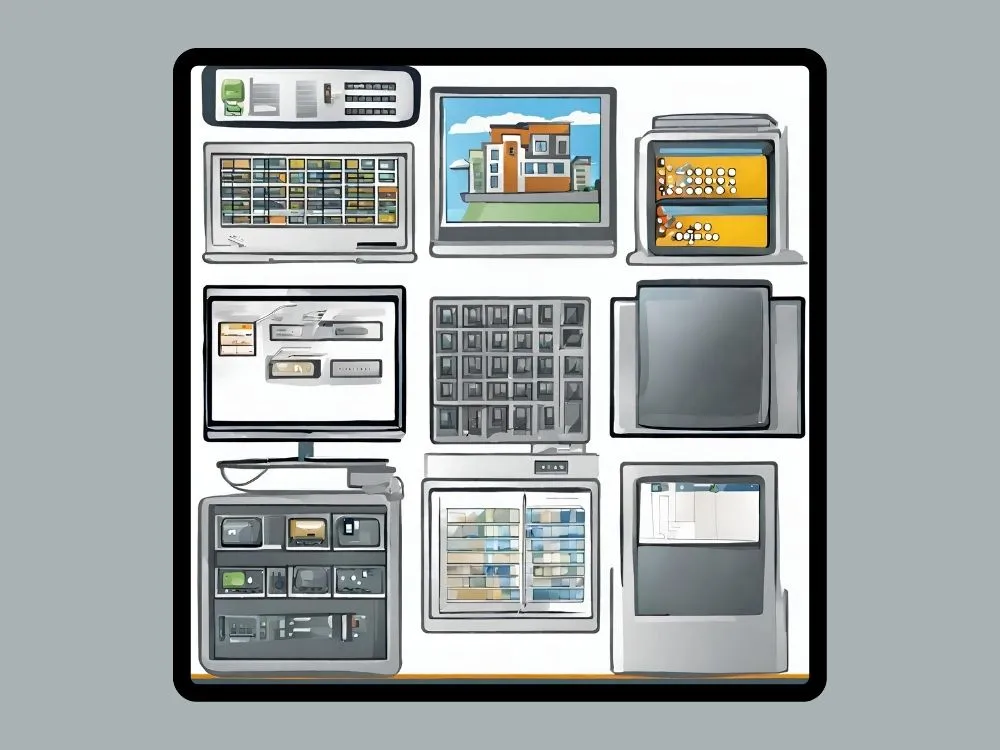
Why Efficient Building Management System is Crucial for Your Business
Is your building eating away your profits without you realizing it? A building management system (BMS) offers a systematic approach to effectively manage facilities through integrated technology. It's also called a Building Automation System (BAS), which optimizes these major building components and reduces related operational hassles.
Every facility relies on multiple systems such as ventilation, electricity, water supply, and many others. These systems require proper maintenance and energy-efficient operation. A BMS automates these services and helps minimize human error, which maximizes performance.
Through field devices like thermostats and controllers, a BMS monitors system conditions and makes precise adjustments. For instance, it can regulate HVAC airflow based on real-time temperature readings that ensure optimal comfort and efficiency while allowing complete management from a simple dashboard.
The Role of Technology in Optimizing Business Operations
Technology is rapidly growing, and it has a greater influence on optimizing business operations. Most of the operational activities are performed with comprehensive technological support. Many advanced technological tools, such as artificial intelligence (AI), automation systems, and new innovations, help ensure an effective business operation.

Modern technology aids in minimizing unnecessary human errors and pitfalls. Therefore, organizations show interest in investing a good amount of money in technology tools that enhance their system performance and business operations. These investments offer a good return to the companies by preventing costly system failures.
Why is a BMS Important for Businesses?
A BMS is significant to run a business with minimal breakdowns and downtimes. It helps automate systems' operations and regulate performance as per the industry standards. It's useful to mitigate huge energy losses, and saves a lot of money for the company.
Moreover, it can swiftly find anomalies in the systems, which simplifies maintenance and cuts unnecessary costs. It also improves the indoor air quality (overall comfort), wellness, and productivity of an organization, which are significant for business growth.
Benefits of An Efficient BMS

a) Cost-Saving Advantages
A business obtains several cost-saving benefits by implementing a proficient BMS at its workplace. It's really helpful to streamline operations and cut unnecessary maintenance and other running costs. A BMS reduces energy costs by automating systems. It reduces energy wastage on vital systems like HVAC, lighting, etc.
Moreover, BMS produces data-driven insights that help make important cost-saving decisions in the organization. A business user obtains many cost-saving benefits by implementing a BMS, where the benefits outweigh the initial investment that people make for integration.
b) Occupant Comfort and Overall Productivity
A BMS creates a positive impact on occupants' comfort and the overall productivity of a business. It prevents frequent operational breakdowns that may significantly impact the occupants’ comfort and workability. Breakdowns are unfavorable, which leads to less operational productivity.
A BMS helps eliminate this problem by lowering routine breakdowns and providing a good level of comfort and safety for the building occupants. Further, improving employee wellness and productivity helps increase the business's gross profit.
c) Reducing Operational Downtime
Predictive maintenance is one of the crucial maintenance types that organizations conduct to reduce operational breakdowns and downtime. To perform necessary predictive maintenance, a BMS is useful, which predicts system failures according to their pattern and issues.
A BMS has past system records and failure status that are useful to implement maintenance strategies and avoid unnecessary operational downtimes. It's essential to take a BMS evaluation to analyze system performance and potential failure status to pre-plan everything in order.
Integration of BMS with Business Operations

How A BMS Seamlessly Integrates with Various Facets of Business Operations
Proper integration is important for a BMS to perform its tasks. This integration happens between several building systems using field devices. A BMS operator or a skilled professional monitors and controls the system using a PC/laptop.
Generally, many field devices are installed in various systems of a building. These field devices are capable of producing signals to the DDC panel that transfer data to the software that is installed in the user’s computer device.
This seamless integration should be done properly, where mistakes can lead to disconnected signals and cause issues in BMS functionality.
Pivotal Role of BMS in Resource Allocation Optimization and Efficient Space Utilization
A BMS also plays a major role in optimizing resource allocation and ensuring proper space utilization. It helps get real-time data, which is really helpful to identify usage patterns and trends that enable the organization to allocate resources to certain areas.
It also helps reduce wastage from improper resource allocation and other consequential costs. A BMS utilizes space effectively for better performance of systems. Plus, it eliminates space problems that may happen through an underutilized space in the workplace.
Enhanced Security and Safety Through a BMS

Robust Security Features Inherent in An Advanced BMS
BMS has inherent robust security features, where business owners can safeguard their property and assets with its support. The system easily monitors and controls various assets of an organization. For example:
An electronic access control system (EACS) is effectively managed by a BMS, which helps prevent unauthorized access to the premises. Also, BMS manages safety through CCTV cameras that trigger alerts when a threat presents. along with other security systems like cybersecurity, equipment security, and many others.
The Role of a BMS in Ensuring Access Control and Comprehensive Surveillance
BMS plays a vital role in ensuring access control and comprehensive surveillance. Access control is managed by the BMS, which ensures authorized entry and exits based on the credentials that strengthen security. It is integrated with occupants' ID systems, biometric readers, and locks that tightly control who enters critical areas.
The BMS handles a network of surveillance cameras that are strategically placed to deliver thorough coverage. It enables real-time monitoring, alerts for suspicious movement, and video storage for post-analysis.
How the BMS Aids in Emergency Response Strategies and Effective Disaster Management
The BMS aids in enhancing emergency response strategies and facilitating effective disaster management. Integrated fire and gas detection systems can quickly recognize dangerous situations and then trigger alarms and alerts. The BMS can communicate with all emergency services and occupants through intercoms and digital displays.
This helps in directing building occupants to safe zones and exit routes when there is a fire drill or incident at the workplace. BMS corresponds with HVAC systems to develop smoke-free zones that aid evacuation. It also controls lighting and ensures a well-lit escape path. Remote accessibility allows off-site monitoring, which enables fast decisions during emergencies.
Case Studies
Businesses reap several benefits through the implementation of a BMS, and here are some real-life examples that highlight the significant benefits;
- Retail Chain Optimization: A multinational retail chain business harnessed a BMS to synchronize lighting and HVAC across its stores. Real-time data analysis adjusted conditions according to foot traffic, which reduced energy usage by 30%. The saved funds were redirected to improve customer experiences and resulted in increased sales and brand loyalty.
- Corporate Sustainability: A tech company integrated a BMS to oversee energy consumption, resulting in a 25% reduction in energy expenses. The surplus funds were distributed to green initiatives that resonated with eco-conscious consumers and elevated the company's environmental reputation.
- Hospital Efficiency: A large hospital complex adopted a BMS for holistic management. The system optimized HVAC and lighting in patient rooms based on occupancy, contributing to a 20% decrease in energy bills. This allowed the hospital to invest in medical equipment that improved patient care.
- Hotel Comfort and Savings: A luxury hotel installed a BMS to regulate temperature, lighting, and water usage in guest rooms. This led to enhanced guest satisfaction due to personalized comfort while saving 15% on utility expenses. The hotel reinvested the savings into unique guest experiences that elevated its hospitality offerings.
- Manufacturing Productivity: A manufacturing plant integrated a BMS to monitor machinery performance. Real-time data pinpointed inefficient processes, leading to a 10% increase in production efficiency and minimized manufacturing cost. The company redirected the productivity boost into expanding its product range and market share.
These real-life examples underscore how an efficient BMS aligns with diverse business objectives, yielding remarkable cost savings, sustainability gains, operational enhancements, and customer satisfaction improvements.
Challenges and Considerations
When deploying a BMS, businesses need to face several challenges. They need proper strategies to address and eradicate these challenges successfully. Here are some common challenges that every business faces when deploying a BMS at their organization:

- Huge Initial Investments: It's obvious that BMS requires a huge initial investment, where many devices are required to be procured by the organization. These devices have to be installed by competent service providers for proper functioning, and this incurs extra costs. Organizations should face this challenge when deploying a BMS, but they should evaluate a cost-benefit analysis. This analysis helps identify the benefits and cost-saving potential that a BMS offers to its organization. This helps make the investment plan with their equity fund or other financing options.
- System Complexity: This is also a greater challenge because BMS is a complex system to install and run. Most businesses eliminate this challenge by hiring well-trained, competent workers from the service provider side who install correctly and reduce potential running failures. Moreover, engineers or facility maintenance professionals who mostly handle BMS are adequately trained to reduce issues. For example, a user should know how to reset the BMS software when there is a malfunction present.
- Internal training: Most of the time, the responsible professionals who are behind the BMS need to provide internal training or induction to new hires. This is important for the new employees to understand how to operate, monitor, and control the BMS perfectly. This can sometimes be a great challenge to experienced workers, where new employees find difficulties in understanding the complex system operation in the first place.
Choosing the Right Building Management System

Valuable Tips for Businesses to Effectively Evaluate and Select a Suitable BMS
Evaluating and choosing a suitable BMS relevant to specific business needs may require a strategic approach. Here are some valuable tips to guide businesses in this process:
- Assess Business Objectives: Every business has different objectives, and assessing them is vital to comprehend how well a BMS helps achieve its goals, whether it is energy efficiency, occupant comfort, or cost saving.
- Conduct a Needs Analysis: Identify the facility's unique requirements. Evaluate factors like building size, vital systems to integrate (HVAC, lighting, security), and scalability for future expansions.
- Vendor Reputation and Experience: Research reputable BMS providers with a track record of successful implementations. Reading reviews, records of successful implementations, and case studies may help in the appropriate vendor selection process.
- Functionality and Customization: Ensure the BMS offers the required features, such as remote monitoring, real-time alerts, and compatibility with the existing systems.
- Scalability: Choose a BMS that can accommodate future growth and technological advancements. A scalable system adapts to evolving business requirements.
- User-Friendly Interface: A user-friendly interface facilitates operation and maintenance. Request demos to evaluate usability and user training requirements.
- Integration Capability: Check whether the BMS can easily be integrated with the current equipment and software. Compatibility prevents issues and costly retrofits.
- Data Analytics and Reporting: A BMS's capability to deliver meaningful data and reports assists informed decision-making. Ensure it offers data visualization and analysis tools.
- Support and Maintenance: Assess the vendor's post-implementation support, which includes technical assistance and software updates.
- Cybersecurity Measures: Inquire about the system's cybersecurity protocols to protect against potential cyber threats.
- Budget Considerations: Balance the upfront costs with long-term benefits. Calculate potential savings from energy efficiency and operational enhancements.
- References and Site Visits: Reach out to other businesses that have implemented the same BMS. Visit their sites to witness the system in action.
- Pilot Testing: If feasible, conduct a pilot test of the BMS in a controlled environment to gauge its performance and compatibility.
- Contract and Warranty: Review the terms of the contract, including warranties, service agreements, and support terms.
All these tips can steer the process of evaluating and selecting a suitable BMS that effectively addresses a business's unique needs, promoting efficiency, sustainability, and operational excellence.
The Importance of Scalability and Future-Proofing When Choosing A BMS
When selecting a BMS, emphasizing scalability and future-proofing is paramount. A BMS isn't just a current investment, but it's a foundation for your facility's long-term success. Here's why scalability and future-proofing matter:
- Adapting to Growth: Businesses evolve and expand over time. A scalable BMS can better accommodate additional equipment, systems, and even new facilities without requiring significant overhauls. This agility saves costs and minimizes disruptions during growth phases.
- Technology Advancements: The tech evolves rapidly. A future-proof BMS integrates the latest technologies, which ensure compatibility with emerging tools and protocols. This prevents premature obsolescence and the need for constant updates.
- Optimized Investments: Scalability means you invest according to your current needs, avoiding unnecessary upfront expenses. As your requirements increase, you can incrementally enhance your BMS's capabilities without replacing the entire system.
- Efficient Operations: A scalable BMS streamlines operations as you expand. Centralized control remains manageable, and the system's performance doesn't degrade with added components.
- Cost Savings: Future-proofing prevents costly retrofitting or replacing obsolete systems. You won't be trapped by outdated technology, which could hinder efficiency and necessitate large-scale upgrades.
Wrapping Up
A BMS is useful in upholding a business operation by providing multiple benefits such as cost saving, productivity enhancement, security, reduced operation downtime, improved occupant comfort, and many more. When integrating a BMS, every business should understand that it has a step-by-step process and needs competent vendors and an installation process.
The system should integrate well with all necessary building services like HVAC, lighting, security, etc. When deploying a BMS in an organization, there may be several challenges that businesses need to face, and evading these challenges requires proper strategies.
FAQs
Q1: What is a Building Management System (BMS)?
A BMS is a systematic approach to managing different building functions like HVAC, lighting, security, etc.
Q2: How can a BMS help businesses?
A BMS can effectively automate tasks, reduce energy use, and improve building comfort. It can create a business space that is more productive and help grow the business.
Q3: Can a BMS lower costs?
Definitely, a BMS reduces operation and maintenance expenses. It uses resources smartly and gives insights for cost savings.
Q4: Is BMS integration complex?
Not really, BMS integration connects systems for easy control from your computer. Proper setup ensures smooth operation.
Q5: How does a BMS enhance security?
A BMS improves security through controlled access and surveillance. It keeps assets safe and occupants protected.
Q6: How to pick the right BMS?
Choosing the right BMS means evaluating goals and considering scalability, ease of use, and security. It's a custom solution for your needs.
Explore Related Posts
https://smarttoolsai.com/post/what-is-commissioning-and-why-is-it-necessary-for-businesses
.webp)